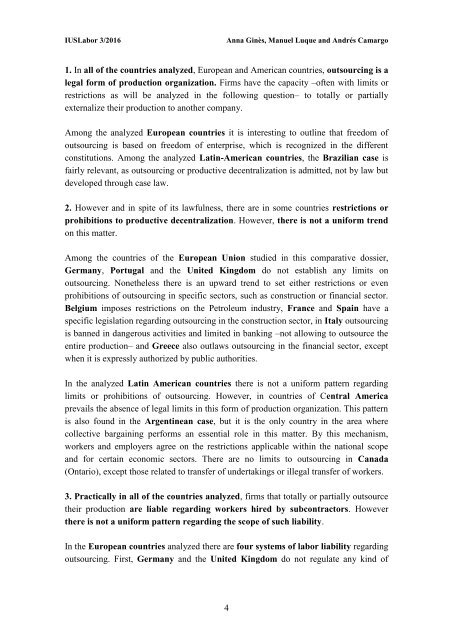wd9Hrt
wd9Hrt
wd9Hrt
Create successful ePaper yourself
Turn your PDF publications into a flip-book with our unique Google optimized e-Paper software.
IUSLabor 3/2016<br />
Anna Ginès, Manuel Luque and Andrés Camargo<br />
1. In all of the countries analyzed, European and American countries, outsourcing is a<br />
legal form of production organization. Firms have the capacity –often with limits or<br />
restrictions as will be analyzed in the following question– to totally or partially<br />
externalize their production to another company.<br />
Among the analyzed European countries it is interesting to outline that freedom of<br />
outsourcing is based on freedom of enterprise, which is recognized in the different<br />
constitutions. Among the analyzed Latin-American countries, the Brazilian case is<br />
fairly relevant, as outsourcing or productive decentralization is admitted, not by law but<br />
developed through case law.<br />
2. However and in spite of its lawfulness, there are in some countries restrictions or<br />
prohibitions to productive decentralization. However, there is not a uniform trend<br />
on this matter.<br />
Among the countries of the European Union studied in this comparative dossier,<br />
Germany, Portugal and the United Kingdom do not establish any limits on<br />
outsourcing. Nonetheless there is an upward trend to set either restrictions or even<br />
prohibitions of outsourcing in specific sectors, such as construction or financial sector.<br />
Belgium imposes restrictions on the Petroleum industry, France and Spain have a<br />
specific legislation regarding outsourcing in the construction sector, in Italy outsourcing<br />
is banned in dangerous activities and limited in banking –not allowing to outsource the<br />
entire production– and Greece also outlaws outsourcing in the financial sector, except<br />
when it is expressly authorized by public authorities.<br />
In the analyzed Latin American countries there is not a uniform pattern regarding<br />
limits or prohibitions of outsourcing. However, in countries of Central America<br />
prevails the absence of legal limits in this form of production organization. This pattern<br />
is also found in the Argentinean case, but it is the only country in the area where<br />
collective bargaining performs an essential role in this matter. By this mechanism,<br />
workers and employers agree on the restrictions applicable within the national scope<br />
and for certain economic sectors. There are no limits to outsourcing in Canada<br />
(Ontario), except those related to transfer of undertakings or illegal transfer of workers.<br />
3. Practically in all of the countries analyzed, firms that totally or partially outsource<br />
their production are liable regarding workers hired by subcontractors. However<br />
there is not a uniform pattern regarding the scope of such liability.<br />
In the European countries analyzed there are four systems of labor liability regarding<br />
outsourcing. First, Germany and the United Kingdom do not regulate any kind of<br />
4


